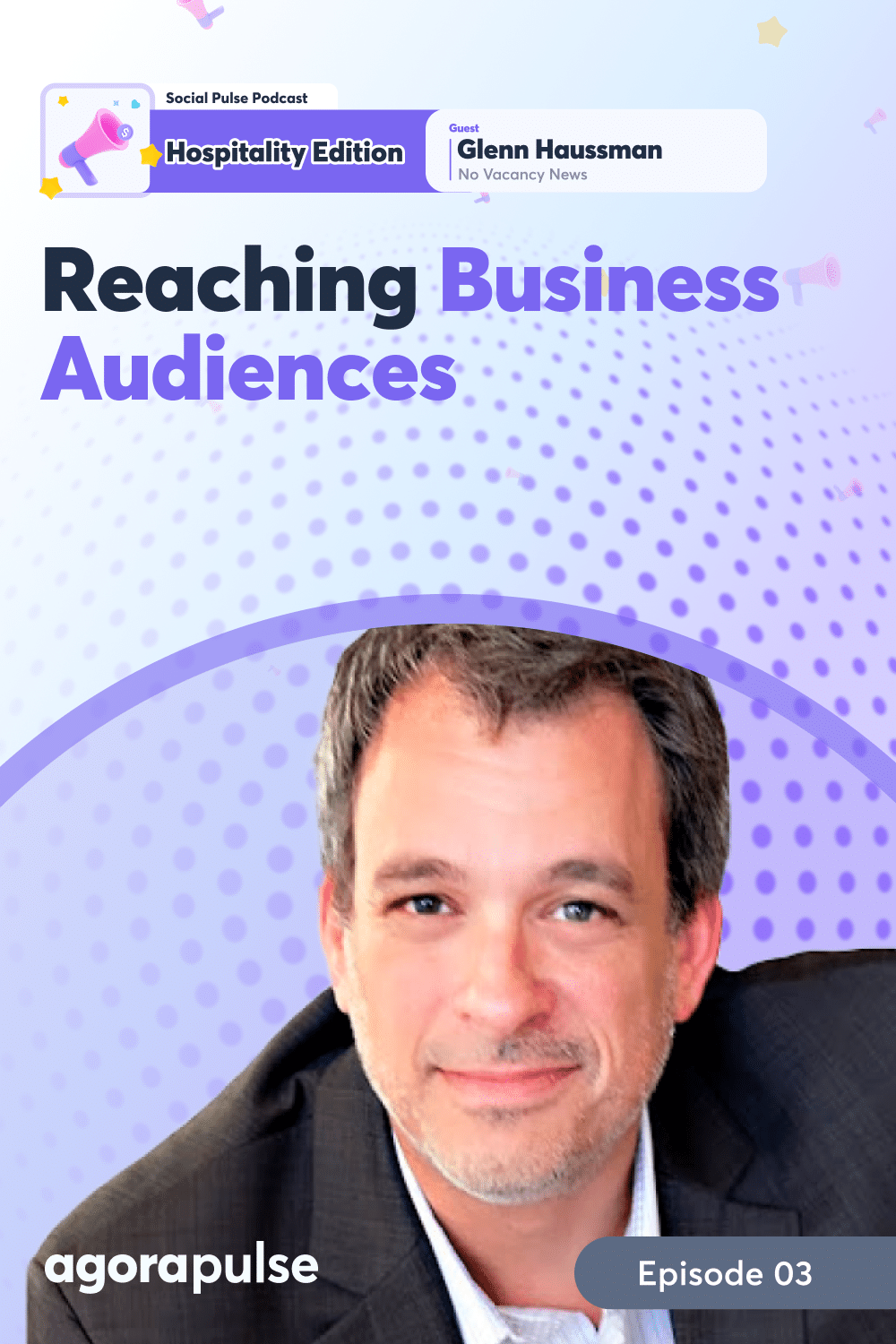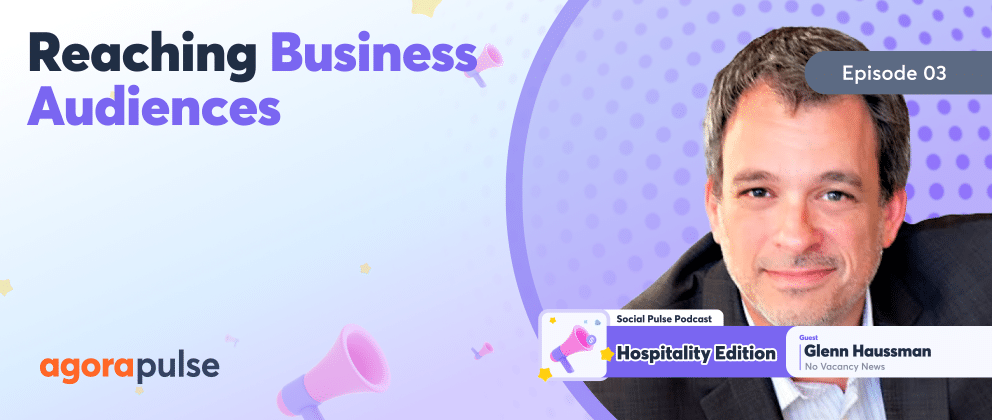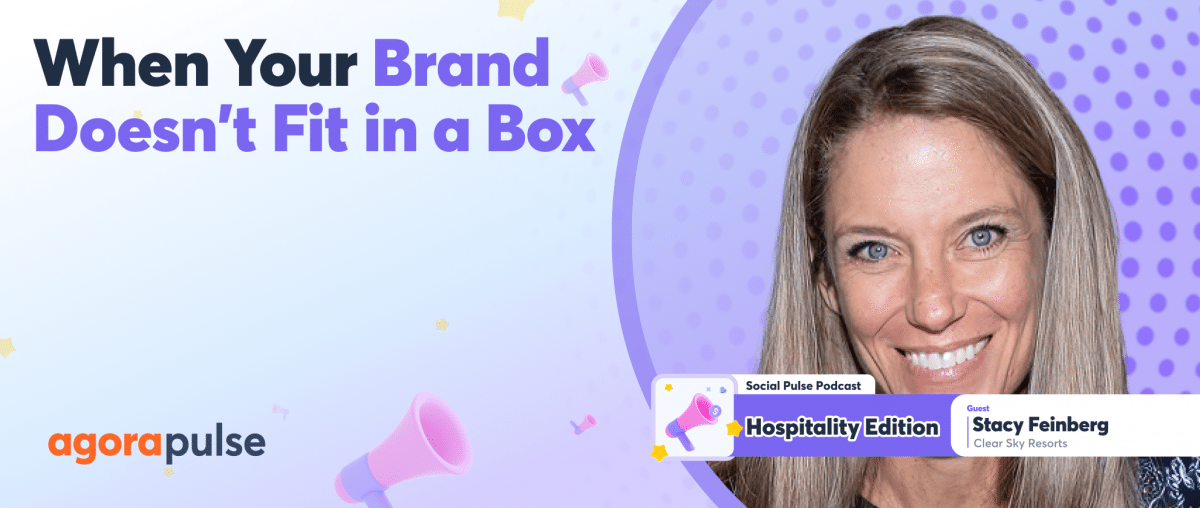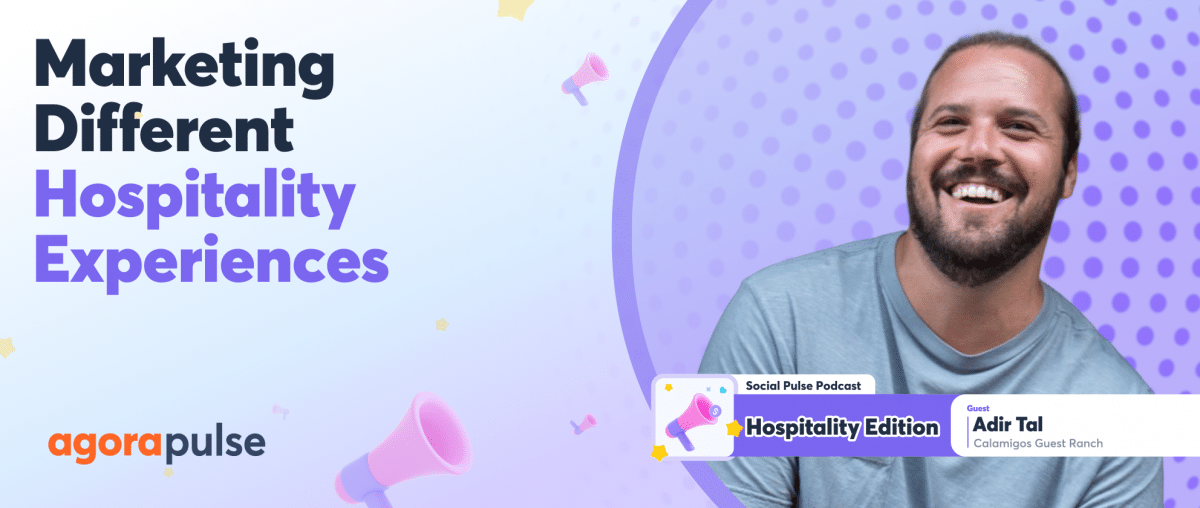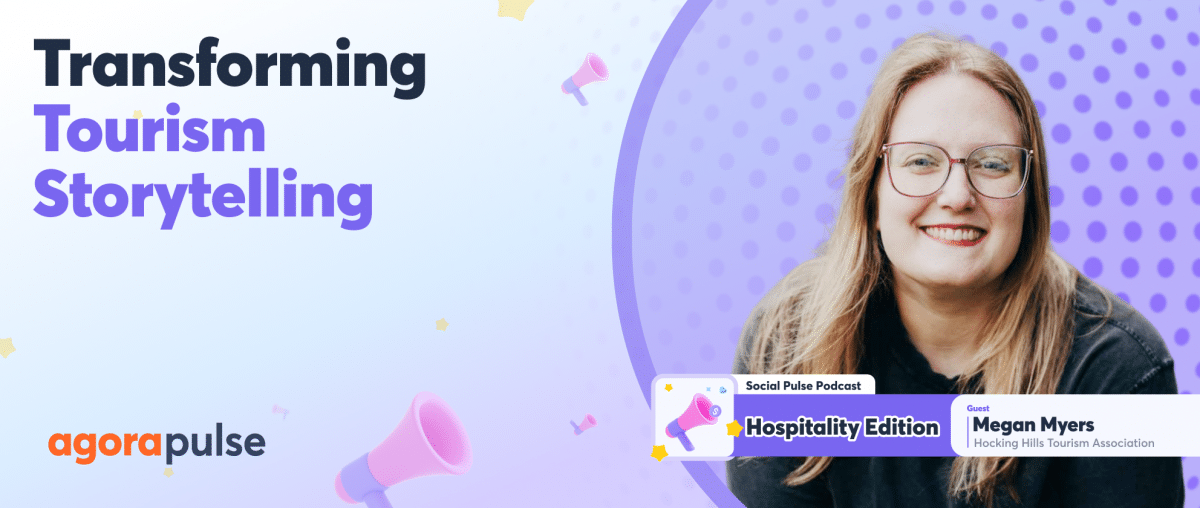What’s going on with meetings and events? One U.S. city reported a 38% increase year over year in meetings and events. Another big market saw a 22.8% growth as well. Overall, the industry grew by 2% and continues to rise.
So, how can hotels and their marketing crews capitalize on this increased demand? What do social media community managers need to know about this segment of their audience, and how are these corporate and business accounts looking at hotels differently than what they’re used to? How should our marketing messaging shift?
That’s exactly what Glenn Haussman answers in the Social Pulse Podcast: Hospitality Edition. Listen to the whole thing below or read on for the transcript.
Glenn is the number-one social media influencer in hospitality. His show, No Vacancy, has been named the number-one industry podcast for 2024 again. (It’s received this honor every year since its inception.) He’s even been in the classroom, serving for nearly 10 years as an adjunct professor at New York University, teaching classes in public relations, advertising, and consumer behavior. He’s also been named one of the top 100 most inspirational people in global hospitality.
How Did You Become the No. 1 Social Media Influencer in Hospitality?
Glenn Haussman: I just want to make sure everybody knows that this is in the business of hotels hospitality and stuff like that, not consumers. But I have a very good understanding of how all of this stuff works for consumers.
I got involved in this business years and years ago. Before I became a trade industry journalist in hospitality, I did music and entertainment.
Quite frankly, the only thing I got out of it was trips to hotels to watch famous people eat nice food and stay in great hotels. And I didn’t get to do any of that. So I said, “Forget about this. I’m going into hospitality,” and became a trade industry journalist.
About eight years ago, I started No Vacancy News and the No Vacancy Podcast, where we’ve got thousands of episodes already in the can because I saw such a shift happening specifically to what we’re talking about today. And that is the whole notion that social media was taking off. Content marketing was going to take off. The whole idea of being an influencer also started to take off.
So I created a business that would allow me to be at the center of what I hoped would be the next big thing.
Mike Allton: Fantastic. And your podcast and your shows—they’re terrific. I’ve been listening to those.
How Do Hospitality Businesses Succeed?
Glenn Haussman: Well, there’s been a big, seminal shift in what we’re seeing right now in society, and that is more towards experiential travel. Even though these things were rooted in some trends that started back in 2008-2009 with the Great Recession, they came to the forefront with COVID, a re-evaluation of our lives, a rethinking of how we want to do business and interact with the universe.
So after we got tired of being at home for a while, the experience economy kicked into high gear. And, again, I want to stress that this is nothing new. This is human nature. Things just moved quicker and changed faster because of the experience that we all shared together in the early 2020s over there.
The big thing is that now everybody needs to get out.
And some of us are doing that leisure work, working some days on the road, playing on the road. Gen Z is most fundamentally interested in only being out and doing things that involve experiences. (That is if they get out of their bedrooms.)
Then you’ve got the fact that business meetings still need to get together. So it’s set the table for an unusual event where smaller meetings are getting larger and they’re happening more frequently. Which is resetting the table on how we need to connect with meeting planners and how we could boost our business in hotels, relying on that meeting’s business.
What Are the Key Differences Between People Going on Vacations and Destinations versus Corporate Meetings?
Glenn Haussman: I do think that there’s a difference in the mindset of a person who’s going to a meeting event as opposed to somebody who’s going to another type of event, a leisure event.
So for folks that are going to meetings, you have to connect and think about what it is that they want:
- How can you change that boring meeting structure that we’ve all done before?
- What types of new and interesting venues do you have?
- What types of new formats can you bring into the meeting?
- How can you partner with the meeting planner in ways that are beyond just saying, “Oh, we have this ballroom here, and would you like the asparagus with the surf and turf, right?”
You need to understand what their goals are and then be very strategic in setting experiences at your property or with your partners to be able to drive those experiences, which lead to attendance for the meeting attendees and for that learning component.
And then everybody goes home much happier because of that partnership.
One of the things that I think is cool is when meeting planners get ideas brought to them because they’re used to doing things in a very particular way, but they’re always looking for new things, and they can’t figure it all out. So what ideas do you have at your hotel level that could re-energize up meeting planners?
Mike Allton: Exactly right. So social media managers, you should be looking at who’s currently using your properties for meetings, right? Filming some content, maybe partnering with some meeting planners, and thinking creatively out of the box so that you can then take those ideas to your social channels and share them with people who are in the idea phase.
What Are the Priorities and Expectations Today?
Glenn Haussman: I think some of the priorities are being able to get your meeting done as efficiently as possible.
Meetings that were four days or three days, three days meetings or two days, and I’m seeing an insanely big growth of meetings that are only one day long, maybe with a cocktail dinner kickoff the night before.
But the whole idea is that people need to be more efficient, particularly as things cost more money. So you want to combine that efficiency, perhaps with a lot of these groups that are also looking for some sort of social element to it, along with those unique cultural elements that are in your town, your city, your jurisdiction, to create a very well-rounded program for people.
Mike Allton: That makes a lot of sense.
And again, just to emphasize the point, that means social media managers, you should be demonstrating through your social content, you don’t just say, “We can make your meetings efficient,” right? You talk about how you’ve got restaurants on-site within easy walking distance. So your people aren’t going to have to spend an hour on the road back and forth just to go get some food and then waste a couple of hours at a restaurant. That blows the idea of having a one-day meeting because you’ve spent half of it off-site.
Glenn Haussman: All right, so the hotel industry did a great job after 9/11, and I’ve been around so long that I remember after 9/11 in the hospitality industry, they didn’t know what to do. So, they ceded control to all of the online travel agencies that have now taken over and continued to be a huge issue for the hospitality industry for the last 20+ years.
The same thing is happening with social media and the birth of YouTube and all of these things. I see incredible properties all the time that have boring meeting planner sites.
Say that we have two pools, but what does that mean? So YouTubers now go out there, and they do all of these incredible things at the property, connecting people and the experience and the location in great ways that keep people excited to go to these properties. So why are you not doing that sort of thing? If you’re a social media person at a property, that plate of food looks good, but what’s the experience? What am I, as somebody watching it, going to feel that’s going to make me want to come and do my meeting?
Mike Allton: That’s absolutely true. That’s something we talk about on this show. It’s something we talk about on our retail podcast.
There are two ideas here. There’s one: As a social media manager, you should be creating what looks like UGC content. We’re starting to call it branded UGC content. There’ll probably be a better name for it in the future, but that’s what we’re typically talking about now. I had TikTok on a show recently, one of their product managers. And that’s exactly the trends that they’re seeing. It’s the brands creating the content, but it’s not highly produced. It’s not staged. It’s an employee walking around with their phone, filming just as if they were an influencer because that’s what relates more with the audience.
Challenges
Mike Allton: Let’s talk about some of the challenges [of] business clients in hospitality.
Glenn Haussman: Behind the scenes, the biggest problem that’s happening right now is that it’s getting much harder to continue to push rates, and hoteliers are starting to try to think differently about how they’re going to get more money from all of their consumers.
- One way they’re going to be doing this is through the use of advancing technologies, the idea of connecting directly with the consumer in more meaningful ways. (Instead of selling a room, you’re selling the amount of money you could get per available customer.)
- If you think about that, that’s going to inform the way you do things going forward. So, when you want to connect with people on social media and through marketing, you need to understand what group of people you’re going for.
- A lot of properties don’t necessarily have a great understanding of what their brand truly is and who their audience should be.
- Therefore, a lot of what they do is try a little [of] this, they try a little of that, but it’s not homing in on that 20% of customers that are going to be the best customers that you can have. They’re just, like I said, throwing things all over the place.
- Technology is going to allow us to get a little bit closer to understanding what our customers are and, companies that are doing the best right now, fundamentally understand the brand experience. And I feel like I’ve given these guys way too much free publicity, but here we go again.
Mike, I love Margaritaville. They’re the one company out there that seems to get it. Everything that they do relates back to who they are as a brand and how that brand makes their target customers feel. And then they do everything that creates that shows the experiences that you could have behind.
Mike Allton: That’s such a great point. How important it is to have an understanding of your brand. My friend Seth Godin talks about this a lot and he has this fun analogy that’s relevant here. He says: If you think about if Nike were to create a hotel, you could probably imagine what that might look like. But if Hilton were to create a shoe, probably would struggle to figure out what could that possibly look like. But if Margaritaville were to create a shoe, I’m sure we could all figure out what that would be.
Glenn Haussman: Because when you say certain brands like Margaritaville, you know exactly what that means in a much deeper way.
Then Marriott or Hilton means because Marriott and Hilton—it’s a sense. It creates that sense of confidence in the consumer, but because they have experiences that go from as far down as the luxury chain scale, the economy chain scale, all the way up to luxury, then you’re muddying up that value proposition.
Margaritaville has remained very steadfast in what their core audience is and their understanding of the attributes that those people have and then followed it up with campaigns that play into those attributes.
“I feel like everybody tries to appeal to everyone. And when you try to do that, then you wind up appealing to no one.
So it’s better to just figure out who you are and then find those people that love you for who you are [than] trying to pretend you’re somebody that you’re not.” (Glenn Haussman)
The more authentic you can be as a brand and have a clear understanding of what that brand means, the more successful that brand will be.
Current Trends
What other trends are you seeing?
It could be in the hospitality industry overall or social media specifically that this audience should know about.
Glenn Haussman: The one trend that scares me as a gray-haired guy is the messaging is shorter and shorter and shorter, and the attention spans are getting shorter and shorter. So the ability to connect with a customer has to be instantaneous.
Marketers need to think about what those social media trends are on there and get to it today. It’s hot, as opposed to waiting 24 to 36 hours when it’s three trends ago.
The one trend that I must talk about is micro-influencers. We all think about the big names that are out there that are on the gossip columns and stuff like that. But it might be Mike Allton in St. Louis who’s got a great following for St. Louis barbecue joints. Those are the types of people that are going to make the biggest difference to you, the ones that are most relevant in your community or in the communities that are your business drivers, and then connect with those people and allow them to do the hard work for you so you don’t have to spend 50 grand for some famous Instagrammer to sit on your piece of luggage.
No, instead, you talk with somebody at the lower level. Maybe they’ll be interested in just coming by and having a meal or staying overnight and having some experiences and sharing those with that audience that could be valuable to you.
Mike Allton: Great advice because, to your point, we’re talking in this episode about reaching business clients, right? And these are not the people who are going to be influenced by Kim Kardashian or some other celebrity going to a hotel because they want to see people who look like them. So the impetus then is on the hotel chains and social media managers and influencers, right?
Find business-like people and influencers who are working in the B2B space. Look at speakers at events and work with them. “Hey, I saw that you’re coming to Phoenix for the B2B Marketing Expo. Hey, if you stay at our hotel, we’ll give you a discount. We’ll work with you on a content campaign.” I mean, do something along those lines.
Glenn Haussman: I don’t know if it’s a fact, but I know it’s true—I feel like a lot of hoteliers are not going out to meeting planners specifically with a lot of social media and trying to connect with them. I don’t recall, and I’m sure somebody brilliant out there has done this, but I don’t know what kind of social media you’re doing that shows what you’re doing for the meeting planners, how you make their lives frictionless, how you add to the experience for their guests.
How do you make those meeting planners look like champs to their bosses and their clientele?
Mike Allton: Homework for all of you listening [and reading], go into your brand’s LinkedIn company page.
Search for all the event planners within a 50-mile, a hundred-mile radius of your location or locations. And follow those individuals and start engaging with them. Put them in a list in Sales Navigator, and you can pay attention to what they’re talking about, the upcoming events that they’re promoting, and develop those relationships with those individuals.
Glenn Haussman: And, hey, let’s get back to basics. I’m all about getting back to basics, Mike.
- Find out who they are, connect with them on LinkedIn if you’re a director of sales and marketing, at a hotel, for example. Why not?
- Build that community, build that network.
- Put up fun, relevant content on LinkedIn, and that’s going to connect you.
We spent a lot of time talking about TikTok and stuff like that, but nobody cares about me on TikTok. My world is on LinkedIn because I’m very focused on business. And that’s what I learned. I thought I had to be big on Twitter back in the day. Nobody who’s going to be influenced by my stuff is on Twitter. They’re too busy running multimillion-dollar companies, you know? So LinkedIn is where it’s at for a lot of us.
Mike Allton: That also makes it honestly a little bit easier on the social media manager because, in our world, it’s challenging to have to combine different posts for different audiences on the same platform.
In this case, we’re saying you really don’t have to do that.
You can focus on LinkedIn, on the event planners and the business audience and absolutely use TikTok, Instagram reels, and YouTube Shorts to hit those vacationers and destination audience. Yeah. Completely different audiences, completely different content.
Glenn Haussman: Mike, we talked about knowing your audience that is coming to the hotel, know your audience and how they observe, how they interact with social media and different, different social media sites are for different needs.
That’s the one thing that has definitely defined itself over the last 15 years with social media.
Marketing Dos and Don’ts
Mike Allton: Who are you seeing that’s doing this today? Are there any hotels that are killing it when it comes to their social media, on any particular platform?
Glenn Haussman: I’m sad to say I can’t think of any examples right off the top of my head, but at least the ones who are doing it are showcasing new venues and different types of places and creating some sort of excitement behind their product.
Things that I don’t want to see are boring ballrooms. I don’t want to see two people holding hands, walking down a beach. And I certainly don’t want to see a lady lying down on her stomach with rocks on her back.
You’ve got to do things that are different and new to break through to an audience that has seen the same thing over and over again. And the great thing with social media is that even if it’s a fail, it’ll vanish into the ether pretty darn quick (assuming you haven’t done something really, really stupid.)
We’re also scared of failing, but you’ve got to see what’s going to work.
One of the things that I’ve learned in my career is that what I think in [my mind] is not what everybody necessarily thinks out there. I’m like, “This is the best podcast ever.” And then it’s like, literally, I can hear the crickets. And then I’ll be like, “This is the dumbest thing. Why do I even do this?” Then everybody loves it. I’m like, “What the hell?” So trust yourself.
But also don’t trust yourself. There’s nothing worse than thinking you’re going to crush it with something, and then you’re completely wrong about it—but it happens, and you move on, and you try something different.
What final advice do you have for social media managers and community managers trying to promote their hotel brands online?
Glenn Haussman: Get out there, try new things.
“Don’t be scared of failure. We all fail, but—as Google is famous for—you want to fail quickly. That way, it can move on to something else.
There’s nobody that’s had any success out there that hasn’t had a long string of failures behind them.
What’s important is keeping your focus, being as authentic as you can, and really trying to connect with the audience that you’re looking for, where they are at—not where you believe they should be.” (Glenn Haussman)
Mike Allton: Terrific advice. You won’t go wrong if you’re trying to connect with the right audience. Glenn, this has been amazing. Such an important, informative interview. Thank you so much.
That’s all we’ve got for today, friends. I’ll have all the links and information in the show notes.
Thanks again for listening and reading to this episode of Social Pulse Podcast: Hospitality Edition, where we’re digging into the challenges, successes, and stories of social media community professionals in the industry, just like you. Subscribe to gain valuable insights that you’ll be able to apply to your own work and social presence from each and every episode.
